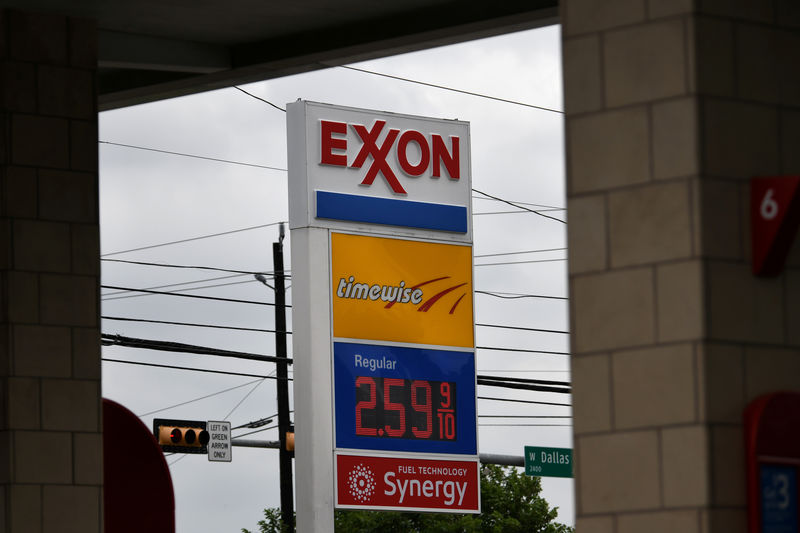By Jennifer Hiller
HOUSTON (Reuters) - Exxon Mobil Corp (N:XOM) and Chevron Corp (N:CVX) on Friday posted sharply lower quarterly results despite increases in oil and gas production as lower energy prices soured earnings for most oil majors.
The two U.S. oil majors credited higher production in the top U.S. shale field for similar 3% volume increases, while warning that sizeable cost overruns at a giant oil field in Kazakhstan, where both are partners, would affect future earnings.
Results mirrored weaker quarterly earnings at BP Plc (L:BP) and Royal Dutch Shell Plc (L:RDSa), which indicated they might delay dividend increases or a buyback program if current low prices continue.
In the third quarter, global benchmark Brent crude (LCOc1) fell 8.7%, the worst quarterly drop since the fourth quarter of 2018, while U.S. crude (CLc1) dropped 7.5% as concerns about the trade war between the United States and China plunged global economic growth to its lowest levels in a decade.
Investors have fled the energy sector in recent years due to returns that significantly lag market indexes. Exxon's share performance in the last three years was down 6.9% while Chevron's rose 20.4%, both well below the 44.6% gain in Standard & Poor's 500 index (SPX).
Exxon's profit was nearly halved to $3.17 billion, or 75 cents per share, beating analysts' recently reduced estimate of 67 cents a share, according to Refinitiv IBES. The results included a favorable tax impact of 7 cents a share. Operating profits in each of Exxon's major businesses fell compared with the same period a year ago.
For a graphic on Exxon's profits by quarter, please click here: https://tmsnrt.rs/2oD2kU5
Chevron's earnings fell 36% to $2.58 billion, or $1.36 per share, in the quarter. Excluding items, the company said it earned $1.55 per share, exceeding the $1.45 expected by analysts.
The two are partners in the Tengiz oilfield in Kazakstan, where the operator, Chevron, said on Friday that overruns will balloon project expenses by 25% to $45.2 billion. It blamed a one-year delay in an expansion project and higher construction and equipment costs.
"If you take away the initial contingencies that they have baked in, it's almost a 50% cost increase to the project," said Anish Kapadia, a director at London-based Palissy Advisors.
Exxon shares were up 2.5% at $69.24 on Friday afternoon while Chevron's were flat at $116.14.
Exxon and Chevron are racing in the top U.S. shale field to reach 1 million barrels per day of production within a few years.
Chevron's Permian Basin production rose 35% from the same period a year ago to 455,000 barrels of oil and gas daily, while Exxon's daily output reached 293,0000 barrels, up more than 70% in a year.
Smaller oil and gas companies in the field are struggling to generate profits, prompting speculation that the majors will scoop up smaller rivals at bargain-basement prices.
"There's a lot of things to consider," said Neil Hansen, Exxon vice president, on a call with analysts. "It's just a question of whether or not we can transact at the right value."
For a graphic on Exxon Mobil's earnings roller coaster:

https://fingfx.thomsonreuters.com/gfx/editorcharts/USA-OIL-RESULTS1/0H001QXGS98C/index.html